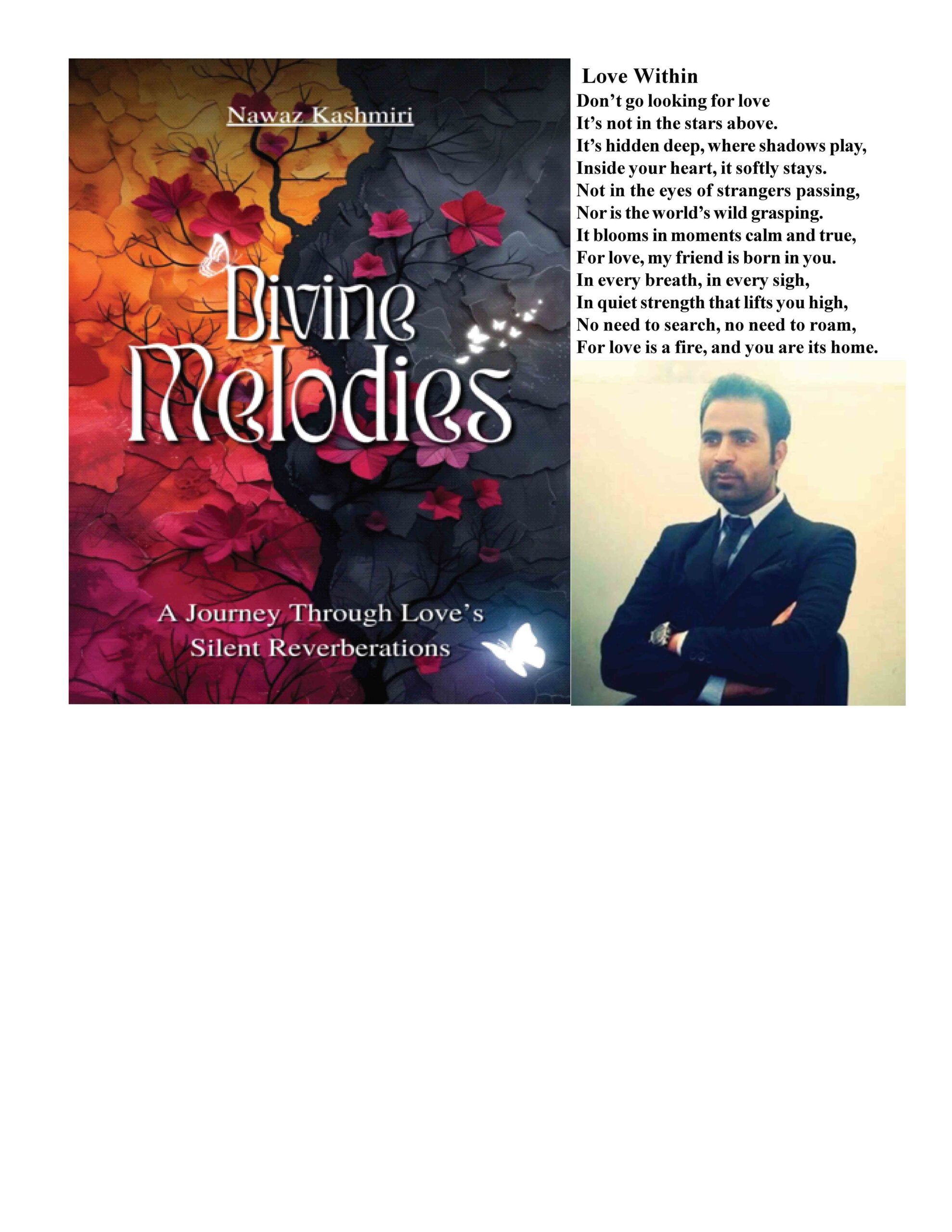By Aubaid Akhoon
Kashmir has long been called paradise on earth—a place where snow-fed rivers weave through emerald valleys, where mountains guard centuries-old shrines, and where poetry is as natural as the scent of blooming almond orchards. It is here, in this landscape steeped in mysticism, that poet, writer, and entrepreneur Nawaz Kashmiri found his voice. His latest collection, Divine Melodies, is more than a book of poems—it is a devotional journey through the soul of Kashmir and the universal truths of the human spirit.
A Voice Rooted in Sufi Tradition
Born in Zagipora, Budgam, Nawaz Kashmiri writes with the cadence of a man shaped by his homeland’s spiritual soil. His poetry draws from the deep reservoir of Kashmiri Sufi tradition, where love, longing, and the search for the divine intertwine. The themes in Divine Melodies echo the verses once sung by wandering mystics—yet they speak to modern readers with clarity and intimacy.
In an era where poetry often struggles to find its place, Nawaz reminds us that verse can still be a spiritual compass. He writes of the eternal dance between the human soul and the divine, of heartbreak and hope, of nature and its eternal laws. The result is a collection that feels both ancient in its wisdom and fresh in its voice.
The Landscape of the Heart
Reading Divine Melodies is like walking through Kashmir in spring—each poem is a bloom, delicate yet unyielding. In “My Love to Divine,” the poet surrenders himself to the higher power, a recurring motif in the collection. In “Sheikhul Aalam (R.A),” he pays homage to the revered saint, blending historical reverence with personal devotion.
Other works—such as “Beyond the Glitter” and “Love Within”—gently nudge readers to look past the distractions of the material world, urging them toward self-awareness and spiritual clarity. “The Gentle Heart” speaks of tenderness as a quiet strength, while “The Law of Nature” meditates on eternal truths that unite all living beings.

A line that lingers is his assertion: “I Am Here to Love, Not to Leave.” It is a sentiment that transcends romantic love, pointing instead to love as a spiritual vocation—a binding force between human and divine.
Light and Shadow
Nawaz’s work does not shy away from life’s sorrows. In “A Night of Shadows,” heartbreak takes center stage, while “Eternal Embrace” finds solace in faith and surrender. Poems like “Candle and Butterfly” explore the paradoxes of existence—how attraction to the light can lead to both beauty and destruction.
In “Resilience in Her Eyes” and “Whispers of the Beloved,” Nawaz captures the strength that comes from vulnerability, and the silent communication between seeker and the sought. These pieces ask readers to see life’s trials not as obstacles but as invitations to deeper understanding.
A Poet, an Entrepreneur, a Son of Kashmir
Beyond poetry, Nawaz is also a successful entrepreneur, holding a BBA and MBA and employing nearly 50 people in Kashmir. His journey from a small village to self-reliance is itself a testament to the resilience he celebrates in his verses. His life underscores one of the book’s underlying messages: when one door closes, another opens—often toward a higher purpose.
A Tribute to Those Who Shaped Him
One of the most heartfelt aspects of Divine Melodies is the poet’s deep sense of gratitude. In the acknowledgements, Nawaz thanks his father, Nazir Ahmad Rather, whose integrity and support have been the bedrock of his life. The quiet dignity of his father’s values is woven through many of the poems.
He honors his spiritual guide, Ali Mohammad Sheerazi, whose teachings have been a steady light on his path, helping him attune to the “sacred tunes” that inspired this collection. Nawaz’s mother, Shameema, and his brothers, Yaqoob Nazir and Bilal Nazir, are also part of the fabric of this work—their love and encouragement forming the emotional foundation for his creative journey.
Universal and Personal at Once
While Divine Melodies is deeply rooted in Kashmiri culture, its themes are universal. Poems like “Canvas of Dreams” and “Silent Closeness” speak to anyone who has ever longed for connection or found peace in solitude. The simplicity of Nawaz’s language belies the depth of his insight, allowing readers to see fragments of their own inner worlds reflected in his lines.
The book also succeeds in blending the sacred and the mundane. A morning prayer, a fleeting glance, a bird in flight—each becomes a symbol of divine presence. In this way, Nawaz’s work reminds readers that spirituality is not confined to rituals; it lives in the everyday moments we often overlook.
Reading as a Journey
To read Divine Melodies is to embark on a pilgrimage of the heart. It is a collection that can be read in a single sitting, but whose echoes stay with you long after you close the cover. The poems are short enough to invite reflection yet layered enough to reward re-reading.
For those unfamiliar with Kashmiri poetry or Sufi thought, the book offers a gentle introduction. For those steeped in these traditions, it feels like a return home.
Why It Matters Now
In a world increasingly defined by noise, division, and distraction, Divine Melodies offers a quiet space to breathe, to reflect, and to reconnect—with oneself, with others, and with the divine. Nawaz Kashmiri’s voice is a reminder that poetry can still be a bridge between worlds: the temporal and the eternal, the personal and the universal.
This is not poetry written for literary accolades; it is written to be lived with. It is the kind of book one keeps on a bedside table, returning to when the heart is heavy or when the spirit seeks clarity.
Final Reflections
Having had the privilege to write the preface to Divine Melodies, I can say that this book is more than just a creative achievement—it is an offering. Nawaz Kashmiri has poured into it his gratitude for the people who shaped him, his love for the land that nurtured him, and his devotion to the divine presence that guides him.
In sharing this work with the world, he invites each reader to walk alongside him, to see what he sees, and perhaps to hear their own divine melodies within. Whether you are a lover of poetry, a seeker of spiritual insight, or simply someone in search of beauty in words, this collection has something to offer.
As Divine Melodies becomes available on digital platforms, I urge readers to immerse themselves in its verses. In its pages, you will find not just the spirit of Kashmir, but the universal longing for truth, love, and transcendence—a longing that binds us all.
The views expressed in this article are solely those of the author and do not necessarily reflect the opinions or views of this newspaper
